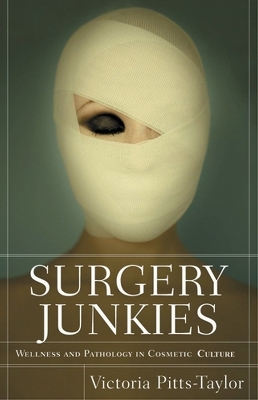
Surgery Junkies
Wellness and Pathology in Cosmetic Culture
Seiten
2007
Rutgers University Press (Verlag)
978-0-8135-4047-4 (ISBN)
Rutgers University Press (Verlag)
978-0-8135-4047-4 (ISBN)
- Keine Verlagsinformationen verfügbar
- Artikel merken
Examines why we consider some cosmetic surgeries to be acceptable and others to be unacceptable and possibly harmful. This book brings fresh perspectives to the promotion of ""extreme"" makeovers on television, the medicalization of ""surgery addiction,"" the moral and political interrogation that many patients face, and feminist debates on the topic.
The ease of accessibility, improvements in safety and technology, media attention, growing acceptance by the public, or an increasingly superficial culture: whatever the reason, cosmetic surgery is more popular today than ever. In 2005, in the United States alone, there were nearly two million aesthetic operations - more than quadruple the number from 1984, along with more than eight million nonsurgical procedures. Innovative surgical methods have also brought cosmetic improvements to new areas of the body, such as the ribs, buttocks, and genitalia. Despite the increasing normalization of cosmetic surgery, however, there are still those who identify individuals who opt for bodily modifications as dupes of beauty culture, as being in conflict with feminist ideals, or as having some form of psychological weakness. In this groundbreaking book, Victoria Pitts-Taylor examines why we consider some cosmetic surgeries to be acceptable or even beneficial and others to be unacceptable and possibly harmful. Similarly, why are some patients considered to be psychologically healthy while others deemed pathological? When is the modification of our appearance empowering and when is it a sign of weakness? Drawing on years of research, her personal experience with cosmetic surgery, analysis of newspaper articles and television shows, and in-depth interviews with surgeons, psychiatrists, lawyers, judges, and others, Pitts-Taylor brings new perspectives to the promotion of ""extreme"" makeovers on television, the medicalization of ""surgery addiction,"" the moral and political interrogation that many patients face, and feminist debates on the topic. While many feel that cosmetic surgery is a deeply personal choice and that its pathology is rooted in the individual psyche, Pitts-Taylor makes a compelling argument that the experience, meanings, and motivations for cosmetic surgery are highly social. A much needed ""makeover"" of our cultural understanding of cosmetic surgery, this book is both authoritative and thoroughly engaging.
The ease of accessibility, improvements in safety and technology, media attention, growing acceptance by the public, or an increasingly superficial culture: whatever the reason, cosmetic surgery is more popular today than ever. In 2005, in the United States alone, there were nearly two million aesthetic operations - more than quadruple the number from 1984, along with more than eight million nonsurgical procedures. Innovative surgical methods have also brought cosmetic improvements to new areas of the body, such as the ribs, buttocks, and genitalia. Despite the increasing normalization of cosmetic surgery, however, there are still those who identify individuals who opt for bodily modifications as dupes of beauty culture, as being in conflict with feminist ideals, or as having some form of psychological weakness. In this groundbreaking book, Victoria Pitts-Taylor examines why we consider some cosmetic surgeries to be acceptable or even beneficial and others to be unacceptable and possibly harmful. Similarly, why are some patients considered to be psychologically healthy while others deemed pathological? When is the modification of our appearance empowering and when is it a sign of weakness? Drawing on years of research, her personal experience with cosmetic surgery, analysis of newspaper articles and television shows, and in-depth interviews with surgeons, psychiatrists, lawyers, judges, and others, Pitts-Taylor brings new perspectives to the promotion of ""extreme"" makeovers on television, the medicalization of ""surgery addiction,"" the moral and political interrogation that many patients face, and feminist debates on the topic. While many feel that cosmetic surgery is a deeply personal choice and that its pathology is rooted in the individual psyche, Pitts-Taylor makes a compelling argument that the experience, meanings, and motivations for cosmetic surgery are highly social. A much needed ""makeover"" of our cultural understanding of cosmetic surgery, this book is both authoritative and thoroughly engaging.
Victoria Pitts-Taylor is an associate professor of sociology at Queens College and the Graduate Center, City University of New York. She is the author of In the Flesh: The Cultural Politics of Body Modification.
| Erscheint lt. Verlag | 30.5.2007 |
|---|---|
| Verlagsort | New Brunswick, NJ |
| Sprache | englisch |
| Gewicht | 333 g |
| Themenwelt | Medizinische Fachgebiete ► Chirurgie ► Ästhetische und Plastische Chirurgie |
| Sozialwissenschaften ► Soziologie | |
| ISBN-10 | 0-8135-4047-X / 081354047X |
| ISBN-13 | 978-0-8135-4047-4 / 9780813540474 |
| Zustand | Neuware |
| Haben Sie eine Frage zum Produkt? |
Mehr entdecken
aus dem Bereich
aus dem Bereich
Der Klassiker kompakt zusammengefasst: 4 Bände, inklusive 1 DVD
Buch | Hardcover (2014)
Lehmanns Media / Elsevier (Verlag)
CHF 279,90


